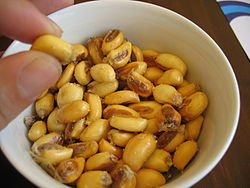Top Qs
Timeline
Chat
Perspective
Corn nut
Snack made from corn kernels From Wikipedia, the free encyclopedia
Remove ads
Corn nuts,[1] also known as toasted corn,[2] are a snack food made of roasted or deep-fried corn kernels. It is referred to as cancha in Peru, chulpi in Ecuador, kikones in Spain, and cornick in the Philippines.
The examples and perspective in this article may not represent a worldwide view of the subject. (July 2022) |

Remove ads
Preparation
Corn nuts are prepared by soaking whole corn kernels in water for three days, then deep-frying them in oil until they are hard and brittle. The kernels are soaked because they shrink during the harvesting and cleaning process, and rehydration returns them to their original size.
History
Originated in Peru and are called cancha, where they have been prepared for over 1,000 years and still are to this day. You can find them in Ecuador and Brazil as well.
Varieties and brands
Summarize
Perspective

CornNuts
Holloway later renamed his product CornNuts. After Holloway and his sons Maurice and Rich learned of a breed of corn grown in Cusco, Peru (often referred to as Cuzco corn[3]) that grew large kernels (some said to have been bigger than a quarter), the company researched developing a hybrid of the Cusco corn that could be grown effectively in California. After a decade of research, the company introduced CornNuts made with the hybrid variety in 1964.[4] CornNuts sold on the market today are no longer of the large Cusco corn size.
The most popular brand, CornNuts was owned by Holloway's original family company until the company was purchased by Nabisco[5] in 1998.[6][7] Cornnuts was a registered trademark of Kraft Foods.[8] On February 11, 2021, Kraft sold the Planters and Corn Nuts brands to Hormel Foods.[9] Corn Nuts are available in seven flavors: Original, Ranch, BBQ (barbecue-flavored), Chile Picante con Limon, Mexican Style Street Corn, Jalapeño Cheddar and Loaded Taco.[10]
Cornick
A Filipino variant of corn nuts is cornick (Filipino: kornik). Compared to the American variety, cornick pieces are typically smaller and crispier. They are also traditionally made from glutinous corn. Garlic is the most common flavor of cornick, with other common flavors including: chili cheese, adobo, barbecue, lechón manok (also known as roasted chicken), and sweet. Major brands include Boy Bawang (literally "Garlic Boy" in Tagalog, commonly sold in small packets), Corn Bits, and Safari.
A popular variety of cornick is the lighter, chicharrón-like chichacorn,[11] a semi-popped style of cornick using glutinous corn from the Ilocos Region[12] which is treated with lime before frying.[13]
Diana
Diana, a snack company in El Salvador, makes a variety of corn-nut-like snacks. These are called elotitos in Spanish, or cornbits.[14] These come in a variety of seasonings, such as Lemon, Cheese and Chili, and Barbecue. These are sold throughout Central America.
Remove ads
Portugal and Spain
In both Portugal and Spain, corn nuts are often eaten as a popular snack. In Spain, they are known as kikones, or maíz tostado ("toasted corn"), maíz frito ("fried corn"), quicos ("Frankies") and pepes ("Joes"), and in Portugal, they are sold under the name milho frito (fried corn).
The base flavor tends to be very salty. Some brands have barbecue versions available.
Recently, crushed corn nuts have been introduced in Spain as a cover for battering.[15]
Remove ads
See also
References
External links
Wikiwand - on
Seamless Wikipedia browsing. On steroids.
Remove ads

